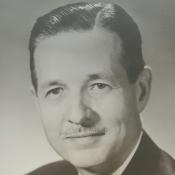James Loring Peirce
 The son of Loring Hampton and Rose Drago Peirce was born September 13, 1907, in Valparaiso, Indiana. Upon the death of his father, he and his mother moved to Chicago where he graduated from Nicholas Senn High School in 1924. His first employment was in a Chicago bank, The Union Trust Company (later absorbed by the First National Bank of Chicago) and it was there that his interest in the field of finance began. While pursuing his professional career he attended evening classes at Northwestern University, graduating in 1930. He was certified as a CPA in 1932 (Illinois).
The son of Loring Hampton and Rose Drago Peirce was born September 13, 1907, in Valparaiso, Indiana. Upon the death of his father, he and his mother moved to Chicago where he graduated from Nicholas Senn High School in 1924. His first employment was in a Chicago bank, The Union Trust Company (later absorbed by the First National Bank of Chicago) and it was there that his interest in the field of finance began. While pursuing his professional career he attended evening classes at Northwestern University, graduating in 1930. He was certified as a CPA in 1932 (Illinois).
In 1927 he accepted a position on the Controller's staff at The Celotex Company, a Chicago-based insulation manufacturer. In 1934 he resigned to join A. B. Dick Company, a family-owned office equipment manufacturer, headquartered in Chicago and then celebrating its 50th year. After a series of finance-related assignments he was appointed assistant controller, and temporarily designated acting controller in 1941. In 1947 he was elected controller, and in 1951 was named vice president-finance. He was elected a member of the Board of Directors in 1966, and six years later became vice chairman. He retired from active business in 1979. During the period of his affiliation with A. B. Dick Company, the company grew into international scope, primarily in the areas of office duplicating and copying, and later in the then new fields of non-impact printing and word processing.
He had a long and distinguished career with the Financial Executives Institute. He was president of the Chicago Chapter in 1950, became a national director in 1953 and remained on the organization's National Board until 1961. During this period he served as chairman of the Planning Committee (1952), and the Committee on Long-Range Research Objectives (1956), and regional vice president (1955). In 1957 he was elected national president and the following year became chairman of the Board of Directors and in 1959 chairman of the Executive Committee. From 1959 to 1965 he was a trustee of the Financial Executives Research Foundation. He was elected an honorary member of the FEI in 1959.
As a member of the FEI's International Liaison Committee he became interested in the early phases of development of the financial executive groups in other countries. In 1967 he represented the FEI as a delegate and speaker at the Ninth International Congress of Accountants held in Paris. In 1969 he was keynote speaker at the First International Congress of Institutes of Financial Executives in Marbella, Spain. Other professional and educational affiliations have included the Council of Financial Executives of The Conference Board, The Economic Club of Chicago, Alpha Kappa Psi, and the Northwestern Management Alumni Association Administrative Board.
In the years 1952 to 1963 he authored over a dozen widely read articles on controllership, planning, budgeting, and related management accounting subjects. Many of these were published in Financial Executive (formerly The Controller, e.g., "Controllership and Accounting: A Contrast" - September, 1953; "The Planning and Control Concept" - September, 1954; "The New Image of Controllership" - January, 1963; "Budgetary Accounting and Its Prospects" - February, 1968. An article on advanced concepts of industrial budgetary practice appeared in the Harvard Business Review "The Budget Comes of Ago" - May-June, 1954. The thrust of his articles and talks was toward raising the function of the controller from that of a chief accounting officer to a level of management participation in every phase of business decision-making, based on the planning and control principle. In the theory and practice he expounded, the element of "control" in the controller's corporate title was to be taken literally, though carefully defined to avoid confusion with direct management authority.
He married Marion Low Field on February 12, 1938; they had two children. He enjoyed dividing his time between his family, his church, and some alumni activities, and he claimed no hobbies other than reading, gardening, and spectator sports. James Loring Peirce died in 1994.
 The son of Loring Hampton and Rose Drago Peirce was born September 13, 1907, in Valparaiso, Indiana. Upon the death of his father, he and his mother moved to Chicago where he graduated from Nicholas Senn High School in 1924. His first employment was in a Chicago bank, The Union Trust Company (later absorbed by the First National Bank of Chicago) and it was there that his interest in the field of finance began. While pursuing his professional career he attended evening classes at Northwestern University, graduating in 1930. He was certified as a CPA in 1932 (Illinois).
The son of Loring Hampton and Rose Drago Peirce was born September 13, 1907, in Valparaiso, Indiana. Upon the death of his father, he and his mother moved to Chicago where he graduated from Nicholas Senn High School in 1924. His first employment was in a Chicago bank, The Union Trust Company (later absorbed by the First National Bank of Chicago) and it was there that his interest in the field of finance began. While pursuing his professional career he attended evening classes at Northwestern University, graduating in 1930. He was certified as a CPA in 1932 (Illinois).